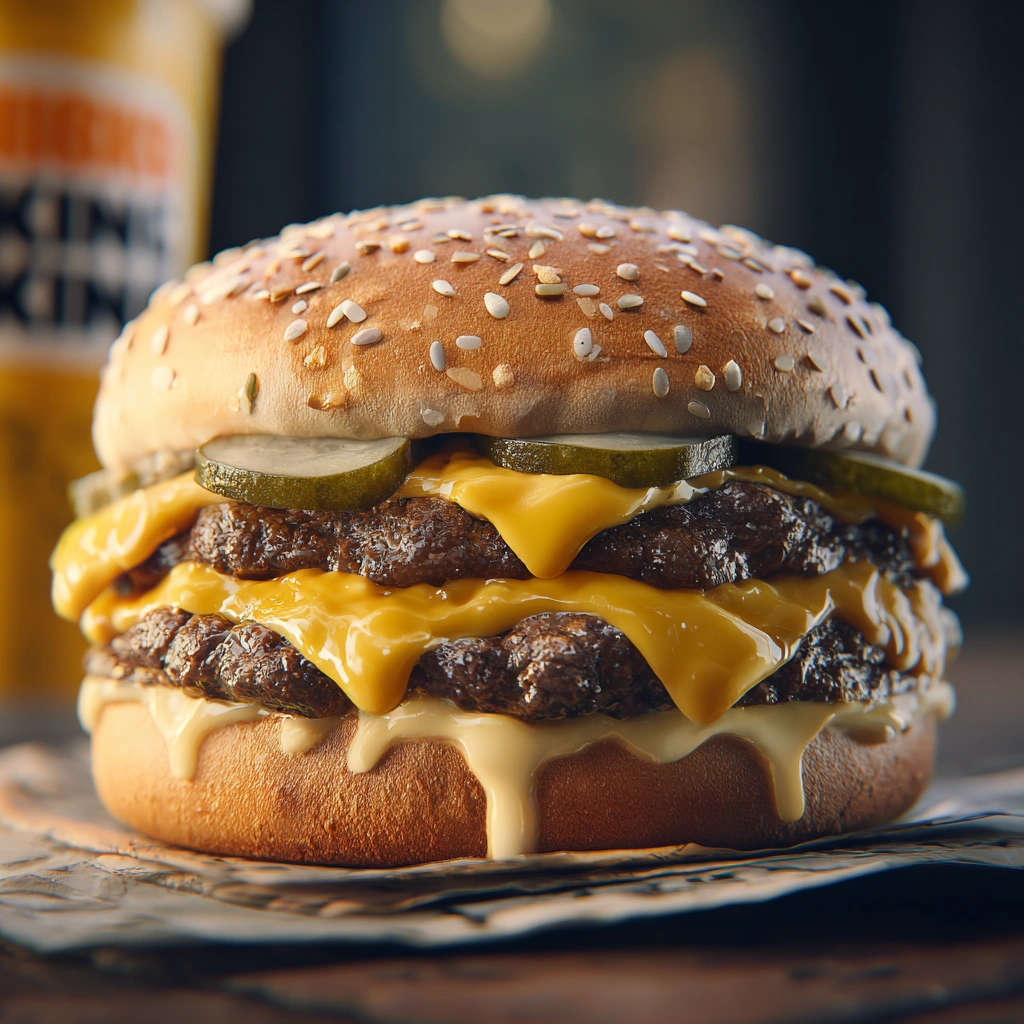Burger King double cheeseburger nutrition is something worth examining if you’re paying attention to your health or tracking what you eat. This iconic fast-food item is flavorful and filling, but behind the taste lies a nutrition profile that might surprise you. In this quick but detailed breakdown, we’ll look at how many calories are in it, whether it offers good protein, and how it stacks up against other choices on the Burger King menu. Plus, we’ll answer common questions and suggest better options if you’re aiming to stay healthier while eating out.
Discover great ideas like our PB&J Burger twist here
Table of Contents
What’s in a Burger King Double Cheeseburger?
Nutritional Breakdown
Burger King double cheeseburger nutrition is more complex than it seems at first glance. While the sandwich is small and easy to eat on the go, it packs a serious amount of calories and fat that can impact your daily intake more than you realize. If you’re counting calories or managing sodium and fat, this item deserves a closer look.
One Burger King double cheeseburger contains approximately:
- Calories: 400–450
- Total Fat: 23g
- Saturated Fat: 11g
- Cholesterol: 85mg
- Sodium: 1,040mg
- Carbohydrates: 27g
- Protein: 25g
When evaluating Burger King double cheeseburger nutrition, keep in mind that the sodium content alone accounts for about 45% of your daily recommended intake. The saturated fat is also high, reaching more than half of what most adults should consume in a day.
Ingredient Breakdown
Understanding Burger King double cheeseburger nutrition also means knowing what ingredients are included. Each sandwich contains:
- Two flame-grilled beef patties
- Two slices of American cheese
- Pickles
- Ketchup and mustard
- A toasted white bun
Though the burger offers a decent amount of protein, it lacks essential nutrients like fiber, vitamins, and healthy fats. The high sodium and saturated fat content make it less ideal for frequent consumption.
In short, Burger King double cheeseburger nutrition is heavy on calories and light on balance. It’s important to weigh taste against health before making it a regular choice.
How Unhealthy Is a Double Cheeseburger from Burger King?
Calorie vs. Nutrient Value
When reviewing Burger King double cheeseburger nutrition, one of the first concerns is its high calorie count relative to its nutritional benefits. While the sandwich delivers about 25 grams of protein, it also brings a heavy load of saturated fat and sodium. That imbalance makes it less favorable for those trying to eat heart-healthy or maintain a low-sodium diet.
Most of the calories come from fat—23 grams total, with nearly half being saturated fat. The 1,040 milligrams of sodium equal about 45% of what the average adult should consume in a day. With this in mind, it’s easy to see why many nutrition experts consider fast food burgers a once-in-a-while indulgence rather than a regular meal option.
Daily Intake Comparison
To put the Burger King double cheeseburger nutrition into context, let’s compare it to daily intake guidelines. Based on a standard 2,000-calorie diet:
- Calories: 20–22% of your daily intake
- Saturated fat: 55–60% of your limit
- Sodium: Nearly 50% of your daily cap
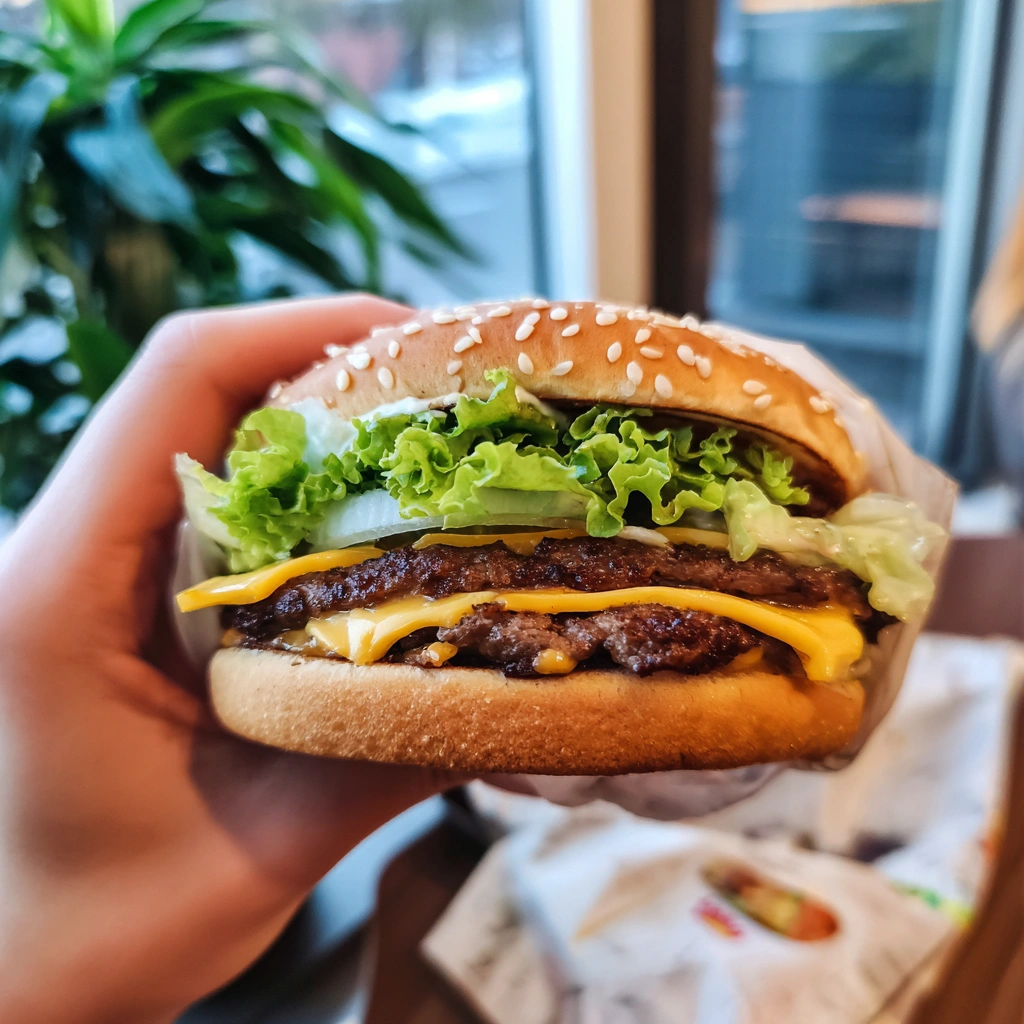
Although it’s tempting, regularly eating this sandwich could contribute to long-term health issues like high blood pressure, elevated cholesterol, and weight gain. The taste is satisfying, but Burger King double cheeseburger nutrition clearly leans more toward indulgence than balance. Check out how the PB&J Burger compares in flavor and nutritional twist
Is a Double Cheeseburger Good Protein?
Protein Content and Quality
One of the most talked-about positives in Burger King double cheeseburger nutrition is its protein content. With about 25 grams of protein per sandwich, this burger can serve as a strong source of protein, especially for those looking for quick options after workouts or during a busy day.
The beef patties in the burger are made from flame-grilled ground beef, which naturally offers complete proteins. These contain all essential amino acids, making them valuable for muscle repair, immune support, and energy. From a protein standpoint, the burger does its job.
Weighing Protein Against Other Nutrients
Still, protein alone doesn’t make a food healthy. When you evaluate Burger King double cheeseburger nutrition as a whole, the high levels of saturated fat and sodium significantly reduce its appeal. The saturated fat sits at 11 grams, while sodium hits 1,040 milligrams. These numbers are substantial, especially when paired with a high-protein label.
There are better ways to get protein without so many negatives. Grilled chicken, lean turkey, or even plant-based proteins offer similar grams per serving with far fewer health concerns. While this burger can help meet your protein goals, it may not be the healthiest way to do so.
In short, Burger King double cheeseburger nutrition delivers protein, but the fat and salt make it a less-than-ideal option. Explore more indulgent but creative options like our Hangover Burger
Healthier Options at Burger King
Better Menu Choices
If you’re concerned about Burger King double cheeseburger nutrition, it’s worth knowing that there are healthier choices available at the same restaurant. Not all Burger King menu items are created equal, and some offer a much better nutritional profile with fewer calories, less sodium, and lower saturated fat content.
For example, the Grilled Chicken Sandwich is a solid option. It contains about 430 calories, significantly less fat, and more lean protein. The plain Hamburger is even lighter, with around 240 calories and fewer processed ingredients. Pair either with a side salad or apple slices, and you’ve got a more balanced meal that’s easier on your body.
Customizing Your Order
Another smart strategy for improving your overall Burger King double cheeseburger nutrition experience is to customize your order. Removing just one or two ingredients can lower the calorie and sodium content considerably.
Here are a few effective swaps:
- No cheese: saves about 80 calories
- No ketchup or mustard: reduces sugar and sodium
- Lettuce wrap instead of a bun: cuts carbs
These minor changes may seem small, but they add up quickly, especially if you eat fast food often. When you’re mindful about what goes into your meal, even the impact of Burger King double cheeseburger nutrition can be minimized.
In the end, healthier options exist—you just need to know how to find and adjust them.
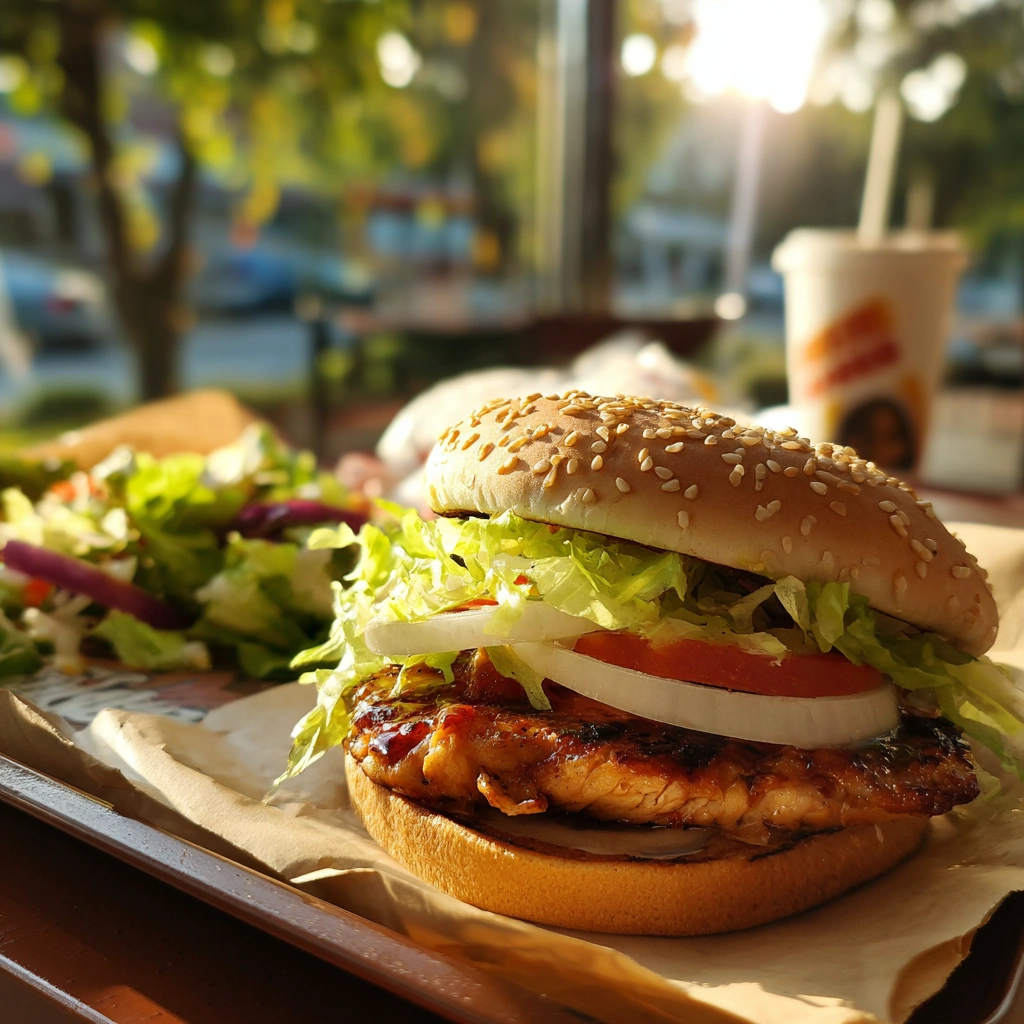
Not always. A burger with lean meat, veggies, and a whole-grain bun can be part of a healthy diet. The key is balance—something Burger King double cheeseburger nutrition struggles to deliver.
Is One Burger Enough Protein?
Protein Quantity in One Serving
In terms of sheer protein content, Burger King double cheeseburger nutrition might seem impressive. With around 25 grams of protein, this sandwich delivers nearly half of the recommended protein intake for the average adult per meal. So yes, one burger is enough to meet your protein needs, especially if you’re not highly active or weight training.
This makes it a convenient choice when you’re on the go and need something quick that will keep you feeling full. However, relying on this burger for your protein intake also means taking in excess saturated fat and sodium, which makes the protein benefit a bit less attractive.
Balancing Protein with Nutrient Quality
Looking deeper into Burger King double cheeseburger nutrition, it becomes clear that the protein comes at a cost. You’re not just getting lean meat; you’re getting high-fat content, processed cheese, and a refined bun. All of this adds unnecessary calories and salt to your meal, limiting its nutritional quality.
There are better ways to get your protein, like grilled chicken, fish, eggs, or plant-based options. These alternatives offer cleaner protein sources with fewer negatives. If you’re eating this burger solely for protein, you may want to reconsider.
Ultimately, Burger King double cheeseburger nutrition does provide enough protein for one meal, but the overall health tradeoff makes it a less optimal choice.
Nutritional Value of a Double Cheeseburger at a Glance
Quick Overview of Key Stats
For those seeking a quick snapshot of Burger King double cheeseburger nutrition, here’s a simplified view of what you’re putting into your body with each sandwich. While it might satisfy your cravings, the real question is—how does it stack up nutritionally?
| Nutrient | Amount per Serving | % Daily Value (Approx.) |
|---|---|---|
| Calories | 400–450 | 20–22% |
| Total Fat | 23g | 35% |
| Saturated Fat | 11g | 55% |
| Sodium | 1,040mg | 45% |
| Carbohydrates | 27g | 9% |
| Protein | 25g | 50% |
What These Numbers Mean
Looking at the chart, Burger King double cheeseburger nutrition clearly leans toward being high in fat and sodium while offering moderate carbohydrates and a good amount of protein. Though the calorie count might appear manageable, it’s the nutritional breakdown that raises concerns—particularly for heart health and sodium-sensitive individuals.
While 25 grams of protein is a solid number, it doesn’t offset the high levels of saturated fat and sodium. The low fiber content also means it won’t keep you full for long.
In short, Burger King double cheeseburger nutrition offers energy and protein—but it lacks balance and essential nutrients, making it more of a treat than a healthy choice.
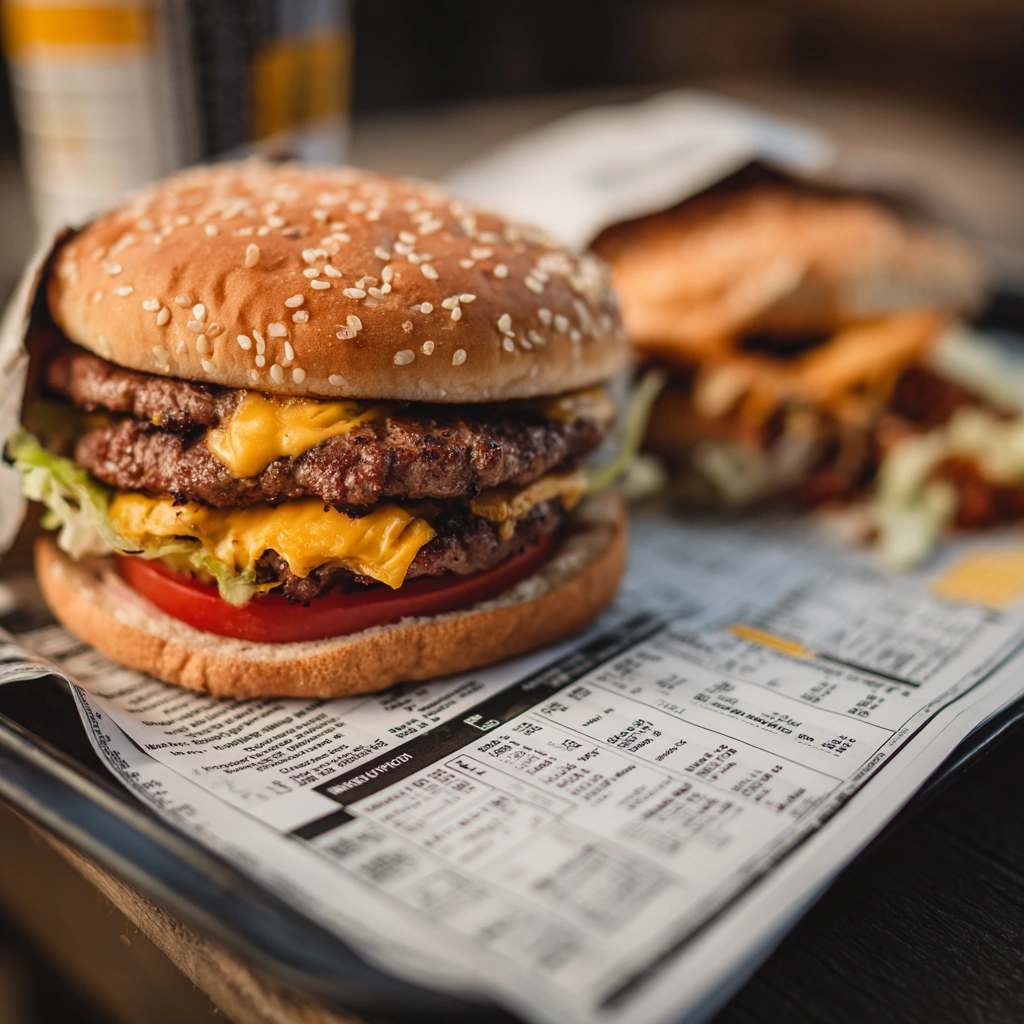
Is a Good Burger Always Unhealthy?
The Truth About Burgers and Health
When most people think of burgers, they often assume they’re automatically unhealthy. But that’s not always the case. The nutritional value of any burger depends heavily on its ingredients and how it’s prepared. Unfortunately, Burger King double cheeseburger nutrition tends to land on the less healthy side of the spectrum.
The double cheeseburger at Burger King is built for flavor and convenience, not for nutritional balance. It features fatty beef patties, processed cheese, and refined bread—all contributing to a high-fat, high-sodium profile with minimal vitamins or fiber.
Building a Better Burger
It’s entirely possible to enjoy a burger without compromising your health. A better burger might include:
- Lean ground turkey or chicken
- Whole grain or lettuce wrap instead of white bun
- Fresh vegetables like lettuce, tomato, and avocado
- Healthier condiments, such as mustard or hummus
Compared to Burger King double cheeseburger nutrition, a homemade or thoughtfully crafted burger offers more control over ingredients and better nutritional benefits.
Even at Burger King, making slight changes—such as removing cheese or skipping high-sugar sauces—can help reduce calories and fat. That way, you’re still enjoying the taste of a burger without all the drawbacks.
So, while Burger King double cheeseburger nutrition isn’t the gold standard for healthy eating, the idea that all burgers are unhealthy is simply not true. It’s all about balance, customization, and awareness.
FAQs About Burger King Double Cheeseburger Nutrition
How Unhealthy Is a Double Cheeseburger from Burger King?
When it comes to Burger King double cheeseburger nutrition, many people want to know just how unhealthy it really is. While the burger isn’t the worst option in fast food, it does contain nearly half of your daily sodium intake and more than half of your saturated fat limit in a single sandwich. It’s a filling meal, but not one you should eat on a daily basis.
What’s the Healthiest Thing to Eat at Burger King?
If you’re watching your intake, skip the double cheeseburger. Instead, go for the grilled chicken sandwich, plain hamburger, or a side salad. These choices are significantly better in terms of fat, sodium, and calories. Making smart substitutions can greatly improve how Burger King double cheeseburger nutrition fits into your diet.
Is It Good Protein?
Yes, it contains about 25 grams of protein, which is solid. However, the high fat and salt overshadow its benefits. If you’re aiming for clean protein, other options are much better.
Is One Burger Enough Protein?
Absolutely. One burger meets 40–50% of your protein needs per meal. But again, Burger King double cheeseburger nutrition gives you that protein along with ingredients you might want to limit.
Conclusion
Understanding Burger King double cheeseburger nutrition is essential if you’re trying to make smarter choices while still enjoying the convenience of fast food. While this sandwich offers a satisfying flavor and a solid amount of protein, it also delivers high levels of saturated fat, sodium, and calories—factors that can quickly derail your daily nutritional goals if consumed regularly.
If you’re trying to eat healthier, the double cheeseburger shouldn’t be your go-to item. While it may be okay as an occasional indulgence, building a diet around high-sodium and high-fat foods like this one can raise your risk of long-term health problems. From a nutrition standpoint, the burger’s strengths are outweighed by its weaknesses.
That said, you don’t have to give up fast food entirely. Being mindful of Burger King double cheeseburger nutrition allows you to make informed decisions. Simple adjustments—like skipping the cheese, swapping the bun, or choosing grilled chicken—can help reduce the negative impact while keeping your meal satisfying.
In the end, Burger King double cheeseburger nutrition makes it clear: this sandwich is tasty and convenient, but it should be enjoyed in moderation. If you’re looking for balance, opt for lighter options on the menu or build your own healthier version at home.
Looking for inspiration? Try our Steakhouse Burger guide for better builds
Follow more tasty recipes on Facebook and Instagram!
Print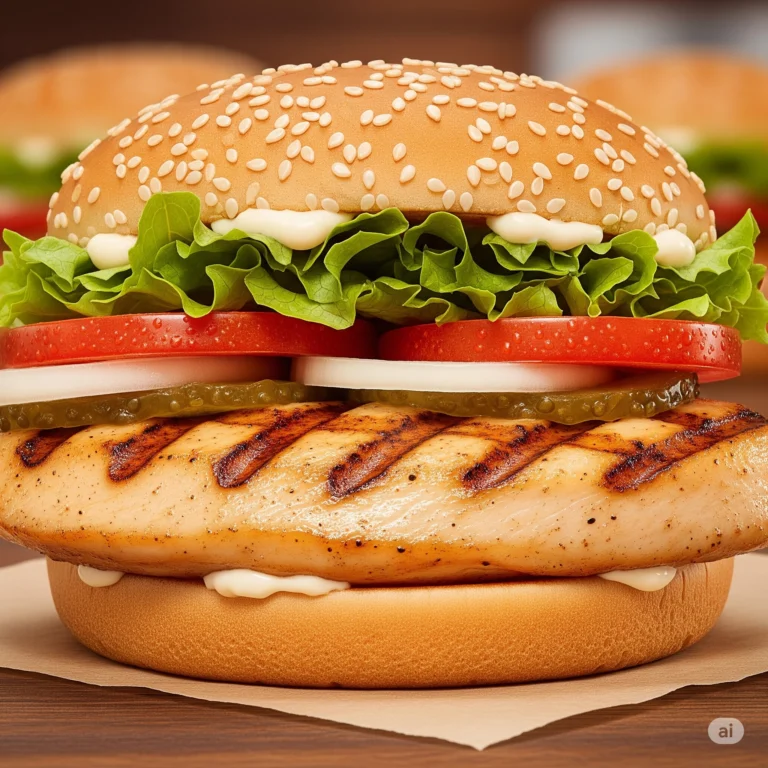
Burger King Double Cheeseburger Nutrition: 5 Key Facts to Know
The Burger King Double Cheeseburger offers a tasty, filling meal but with a high calorie, fat, and sodium count. This breakdown reveals the nutritional details, protein content, and some healthier alternatives to consider.
- Total Time: 0 minutes
- Yield: 1 serving
Ingredients
- Two flame-grilled beef patties
- Two slices of American cheese
- Pickles
- Ketchup and mustard
- A toasted white bun
Instructions
- Order a Double Cheeseburger from Burger King.
- Enjoy the combination of two flame-grilled beef patties, cheese, and condiments.
- Consider customizing your order by removing cheese or swapping the bun for a lettuce wrap for healthier options.
Notes
You can make the burger healthier by removing cheese, ketchup, or mustard, or choosing a lettuce wrap instead of the bun. Other healthier options include the Grilled Chicken Sandwich or a plain Hamburger.
- Prep Time: 0 minutes
- Cook Time: 0 minutes
- Category: Fast Food
- Method: No Cook
- Cuisine: American
Nutrition
- Serving Size: 1 serving
- Calories: 400-450
- Sugar: 5g
- Sodium: 1040mg
- Fat: 23g
- Saturated Fat: 11g
- Unsaturated Fat: 12g
- Trans Fat: 0g
- Carbohydrates: 27g
- Fiber: 1g
- Protein: 25g
- Cholesterol: 85mg

